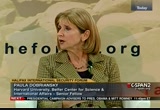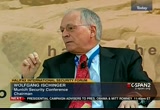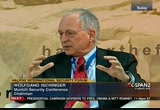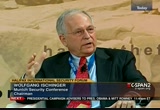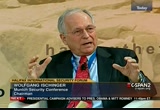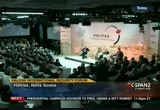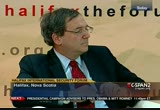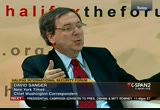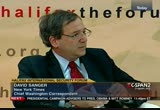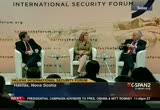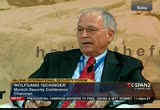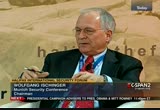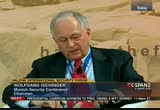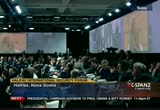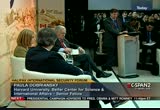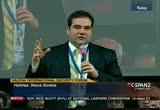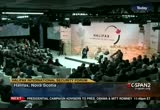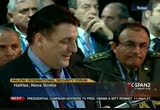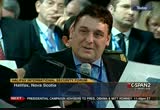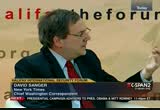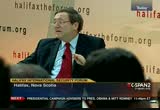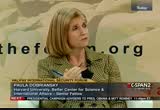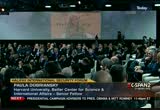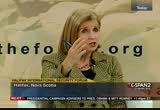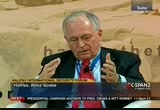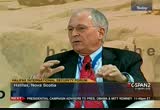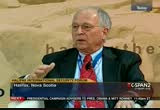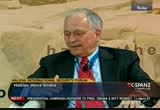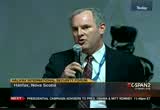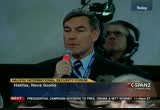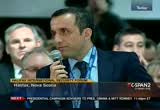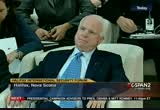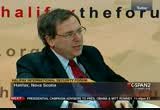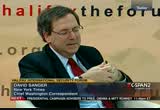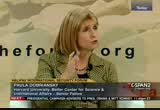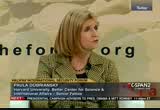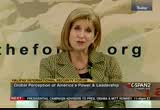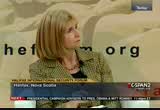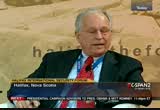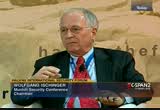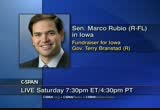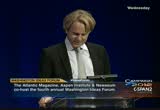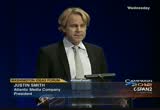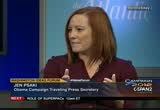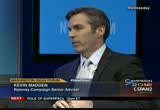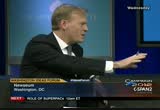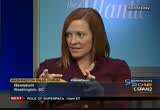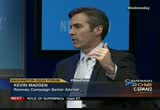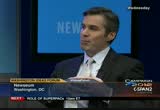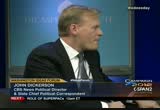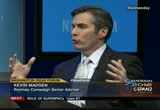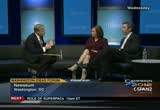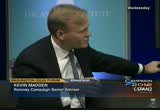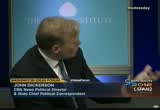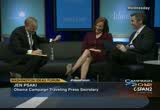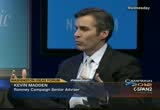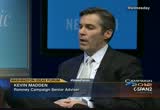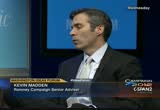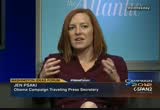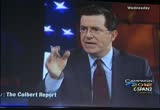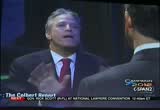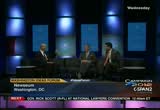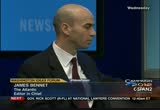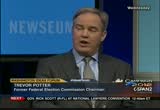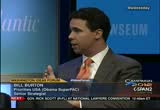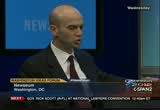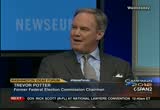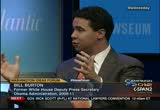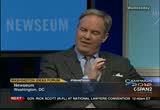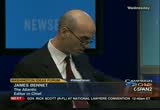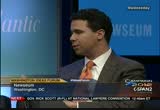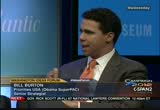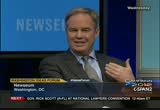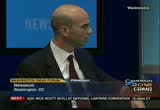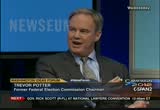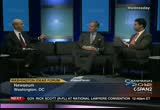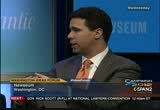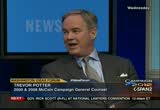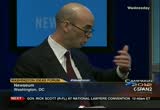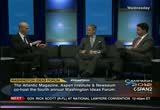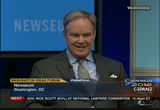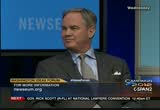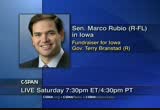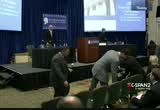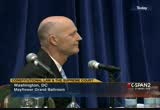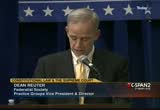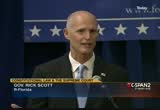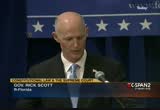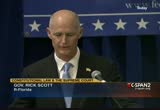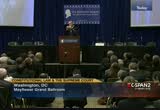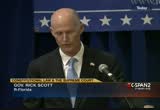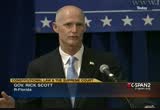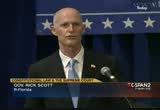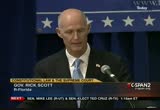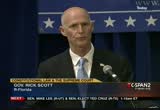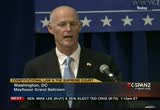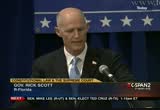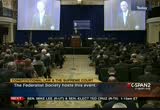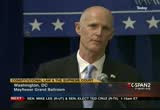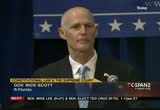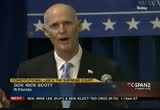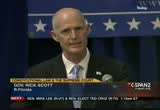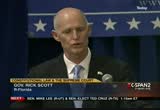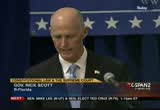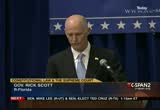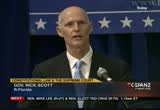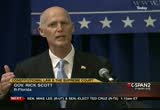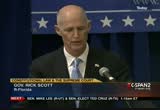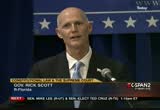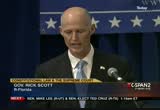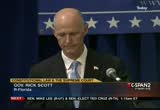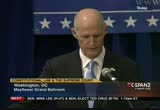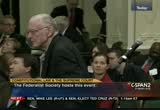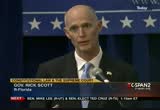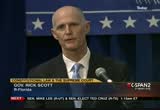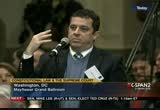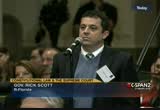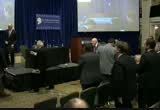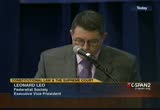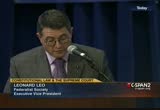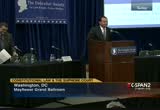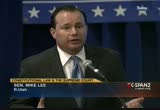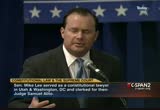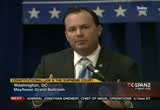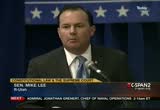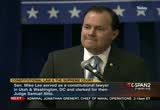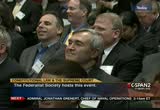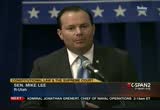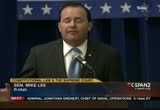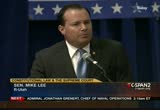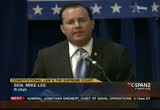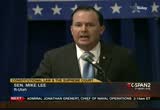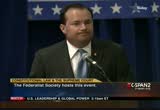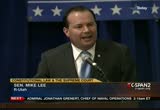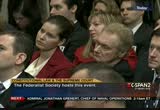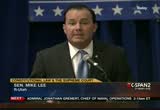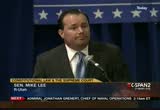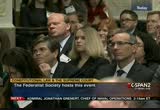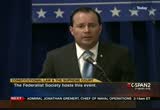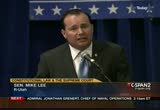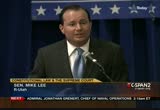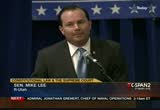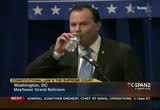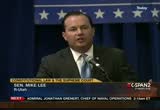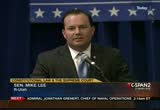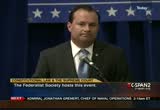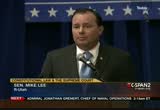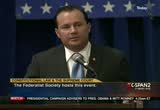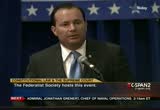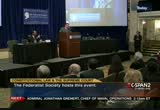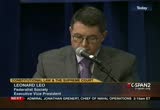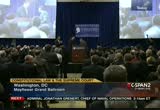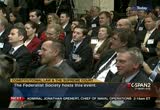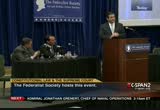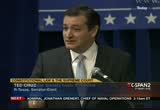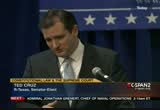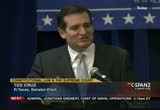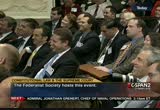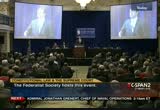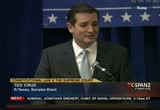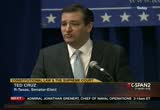tv Capital News Today CSPAN November 16, 2012 11:00pm-2:00am EST
11:00 pm
one thing that has always been constant is the worst way of doing that is taking our model and merely transplanting it on the soil of another country. we've never done that, but now there's a heavy emphasis on the importance of working internally in other countries and really working close hand for sustainable long-term results. in other words, troops on the ground. we focused on that, but that's come even more so to the forefront. what strikes me and gideon, this goes to the heart of what you ask. it is a fact when you look at where do people come? they come to the united states. i still don't know that there is a high volume going to china. [inaudible] >> yes, stand corrected. the point is they are not going
11:01 pm
to the china model. so i think that's an important establishing factor and we need to keep th >> i guess they need to a senator mccain for permission to quote from memory obviously from what he said in munich last february, which is pertinent because he made an important point. he said, maybe you can even use the word. the arab spring will come to china? i think we should be quite self-confident, not overconfident, but i think we have a sustainable model and then much less certain that china has at this point a truly sustainable model. so that's not really my worry from a european point of view. my worry is a different worry. i worry as we look at these
11:02 pm
global challenges that paula mentioned from terrorism to piracy to proliferation, it better, et cetera, our ability to create and maintain a functioning system of global government -- governance appears to have declined. our ability to have a working system of global governance. when i look at what's going on this area, to u.n. security council is dysfunctional, not working, not capable of coming to a conclusion. the g20 has not fulfilled, at least not according to me, the expectations we had when this larger body was created. in other words, from a european point of view, you need to worry
11:03 pm
about the fact that europe will have obviously a smaller portion of the cake in the future. germany is going to a 1% of the worlds population. the e.u. altogether 5%, 40 or so. in other words, what probably needs minority protection. we have a ton about that much. that's a specific problem for europeans, not so much for americans. if that is correct analysis, did we need to worry about global governance. we are capable as long as we are in charge and as long as we still represent to some degree the majority and as long as are
11:04 pm
capable for helping to shape the international system. we are capable of shaping an international system, which will be sustained even when we are only a minority. in other words, we called the shot. can we reform the u.n., the g20 system and other national institutions, including the world bank with an antiquated voting systems, et cetera, in the way the rising powers, when they ask for a greater share of the cake, that they find that acceptable, legitimate and fair? i think that is a huge task we should commit ourselves to, but with a sense of confidence. so far i think there is no reason for us to believe that we've run out of steam. >> i feel like i'm back in the u.s. election talking about the travails of the 1%.
11:05 pm
let's broaden the discussion. we'll bring in some more diverse voices from different people, different is. anybody want to enter the conversation, just raise your hand, calling you. people with makes will state their, affiliation and ask a question or make a comment. any questions or comments from the floor? yes, over here. >> thank you. i would like to ask you the following question. you have mentioned a number of tools such as cyberweapons, such as drones and special forces. they are not in themselves. they are just tools.
11:06 pm
to achieve what is the big issue it was a smart move, but he didn't resolve the iranian problems. same for other places. so my question is, don't you think that there is some kind of an biggie t. trying to use new, smart technology, that kind of stuff, pretending to get solutions and at the same time, let's say the political diplomatic approach doesn't provide solution in the end. so, isn't it a signal that we are shifting from her politics and diplomacy and rely on tools
11:07 pm
of solutions. >> is the war on terror divided into a problem rather than addressing the more fundamental issues that might have led to the spread in popularity of chiapas in the first place? >> i certainly think the footprint strategy is intended to do exactly what the questioner is suggesting here, which is simply one of containment, but to do without sending in 100,000 troops and accepting a chilling doublers along the way. but you think about the american reaction to 9/11, 9/11 cost the attackers may be have been dollars of "the new york times" went about trying to do an assessment at the 10 year anniversary of what we spend in total in reaction to 9/11. everything from rebuilding the buildings to the wars in afghanistan and iraq to homeland security and so forth.
11:08 pm
the number we came up with was $3.3 trillion in this paula has made the point, this is not a long-term sustainable thing if you want to be investing at home and all of those things that can do much more good and creative work. or if you want to invest abroad. so the tools that i described, cyber, drugs, special forces are very much a containment strategy. where i think the united states has run into trouble right now is in the years immediately after 9/11, we thought we had a prewired society strategy and we tried them in afghanistan but we tried them in iraq and we made very little progress. as paul is pointed out, we very rarely have made much progress in these efforts to go to these kinds of things. i think the exception might be a marshall plan and rebuilding of
11:09 pm
japan and they were significant exceptions. right now we are struggling to come up with with a positive agenda is beyond diplomacy, were used frequently feel uppers have been frustrated because there's so many different power centers and different interests. >> just one foot out. i think it would be a strategic mistake if we thought we could actually use these tools to procrastinate and not to do with the underlying cause as you say. i give you one example. i think it is not good that for the last number of years, nothing serious has happened on the arab-israeli situation.
11:10 pm
i hope that the european vat, you know, we can get our act together. i think europeans would be eager to help if the reelected obama administration wanted to take the lead and kickstart a process that deserves to be called a peace process. we certainly hope that would have been. with regard to the drug problem, i just want to add that of course everybody is now buying drones, even european armies are buying drones. but interestingly enough, as are injurious to countries in other parts of the world has declined
11:11 pm
because of the not so successful experience in over the last decade. i hope i'm correct i cannot recall a moment in recent history where in the absence of, you know, act of u.s. leadership or participation, the europeans are contemplating driving up plans right now for a military mission to molly. with the argument that what is going on in molly could he not necessarily, but could develop into something very similar to the kinds of phenomena that forced us into afghanistan a decade ago. so what i'm trying to say is the birth of the drug technology matters, i don't believe
11:12 pm
international development will allow us the luxury of keeping the boys home. there will be unfortunately contingencies that will force us to address the question of are we defending our security outside our own borders and i think we'll have to do it in the future. that is my argument that we cannot in europe simply cut defense budgets more and more and more and more without risking essential security interests of our own countries. >> i thought the question is an interesting one because looking at our affections, i think there's a number of issues at play. david describes certainly the position that has been advanced by the obama administration and president obama.
11:13 pm
during the foreign-policy debate, in fact there was an outbreak discussion about traditional means of warfare versus some of the coming you know, newer versions. i hesitate saying this of course is senator mccain here because you really jumped on this, but the short of it is very strongly held differing viewpoints on this. so starting with your cash in, david was preventing presenting one view. any survey said there are differing views. we will also be headed towards the sequestration debate discussionpromotes a very significant one over the issue of our defense budget. thirdly you have in this mix public opinions. they know that americans are not working to having i think we'll
11:14 pm
aime two important points, one of which is afghanistan. right now there's the discussion of the forces agreement and what kind of presidents would still continue to be underground. my guess is they think of the time ahead that this discussion is going to go through several evolutions in terms of what we do with afghanistan and with the investment we put in afghanistan that is wolfgang also made the point about diplomacy and i didn't want to put that in the mix because that is part of your question. these are elements, so clearly diplomacy is critical and he gave one example. there's many other examples where you obviously have to have that and have that kind of engagement, which at times has been said that we haven't had
11:15 pm
unfortunately. >> i can see the live tweeting has 30 begun. let's get a couple of questions or comments over here and then over here. >> i am dan randy i hold a share. we've been talking the new normal and one of the areas for us to think about is bringing together of diplomacy, development and defense that these sectors are coming and being forced to work much more closely together. certainly in the case of the, this is both a defense problem and also a development problem. their weak states, for security issues, health security setter travis charters of some of the conflict we are seeing. so could each of you speak to how we do a better job of bringing those different forces together because you've each touched on them, but certainly could talk about the broader
11:16 pm
context of we've been putting in some of the core issues. to some extent were using drugs and technology to deal with tactical issues, but perhaps we accused development programs for the broader strategic challenges. >> i and john manley from canada. in your assessment of the new normal, i didn't hear any discussion of the impact a very strongly developing movements in the world for the, particularly impacting how comes that democratic elections as well as perhaps creating a certain amount of instability of governance models that we face. i'd be interested in the panel's assessment of the impact of fundamentalist religious
11:17 pm
movements and particularly in the context of what is going to be a new normal. a >> let's get one more in here. you can just use this. [inaudible] [inaudible] >> i would've been too much. i think what is so interesting about this discussion raised by author participants is the baseline question and just putting the question of the new normal in the context of america, american powder and leadership and i was just so
11:18 pm
does seen how powerful did america in 1979 after the tom, not very. how powerful did america look in 188910 years later extremely powerful. how powerful did america look in 1899? it looks essentially invincible. how powerful and 2009 now? we settled down, but we don't know what we settled down into. it started the basic question we forget how quickly the perceptions and strength of american leadership can be. one question that arises and what can potentially be questioned about the new normal is in all of these previous. from the perception has been that america has wanted to lead the free world and i'm not quite so sure whether america really love to do that anymore and i wondered what she thought about that. >> will get some responses to these questions.
11:19 pm
>> i think you picked up quite rightly the question of the degree to which the united states wants to lead it was seen as a subset of fact, wants to spend the resources that it takes to lead. so you hear this doubt and president obama's own words each time he was gone to give a major speech on afghanistan, the west point speech on the command of the company pulled tight again during presidential debates. he kept saying it's time for nationbuilding at home. what was that tapping into? that was tapping into an emotion you hear the electorate can see in the polls. i'm not saying it's a good thing or bad thing, but americans feel as if we are overinvested abroad. then you look at events to which we feel we are the in the united states, that things are out of
11:20 pm
control, there isn't enough american power and you have become that much to that, which as any to stay invested as we were in that golden. you just describe between 89 and 99, which is a great unipolar moment. the message you hear from the obama administration is that moment is that coming back again. you have to pick your fights according to national interest. what's going to be fascinating in the b. of got into a discussion, a debate between the republican defense secretary and robert casey said there's no american national interest here in that group of people that the secretary clinton, susan rice and others that we have a responsibility to protect enough with the the argument going in. that argument remains unsettled in washington today and that is
11:21 pm
the doubt i think you're picking up on your question. >> i'll make several comments. i'm working backwards on yours, you know, i look at it this way. the united states has the capability in this period in time, but secondly it's the united states that has taken the responsibility and step forward. i can't come to another country but to take that responsibility. david is the approaches in dealing with responsibility and more cost effective ways. having said that, i would argue there is going to be a big
11:22 pm
debate over this issue because there are many different ways of advanced team strategic interests. i flip to the first question on diplomacy development and defense. i think many of you know when certain members of congress here would get the question tears at a festival amount of foreign aid we give abroad than the fact is that under some 1%. why mention that that hence the question that investment is a form of leadership and investment in stabilizing other areas and it does matter and does fit in the diplomatic and as well as the defense end. defense doesn't have to be on the traditional definition of defense here. those kinds of investments can
11:23 pm
make a difference. i see synergy here. just a footnote on your question. i wanted to actually mention something else. you mentioned fundamentalists, but i look at the united states and our particular backyard in north america are backyard and that is what is happening in venezuela. there you have at least in the first election that observer with iri and that was a free and fair election. you have a leader who is not fitting in the category you just mentioned, but someone who basically has used elections in nondemocratic ways. is elected and, it's nondemocratic measures which impacts us. that is a very challenging situation to grapple with in addition to the fundamentalist. from a european point of view
11:24 pm
the so-called moment has led us in nato, has led the west and the united states in my view to over emphasize the possible use of the military. i think over the last decade we have been forced to acknowledge that the obligation of military force tends to solve the dust military challenges. but if you are faced with the political problem, you need a political solution, which means more than just the military. that appears to me to be a growing consensus in our
11:25 pm
community. that leads me to the first question about the gentleman over there, development in the military. i mean, as a part titian or of diplomacy, i find that the last decade and a half should have taught us one clear lesson. it was not so difficult to get nato to go into the balkans. it was not so difficult at the end of the day to come up with a collective approach to afghanistan. but each time we went somewhere with our highly organized forces , radio frequency hopefully, et cetera and could speak english to one another. we found that in the nonmilitary areas, we were fully protected. we didn't find policeman,
11:26 pm
judges, administrators to help us through the long haul that each time follows the deployment of military forces. you need strategic patience and what's the word, sustained after. i remember when president clinton said in 95 or so we will go into bosnia for one year. the german cabinet just decided this week to withdraw our last soldiers from bosnia. some people don't even remember why we are there it's been so long. but it took more than a decade to get even this little problem right in to this day we haven't gotten it right. bosnia still not in good shape. a huge civilian effort required
11:27 pm
will need to go on and on for any number of years. cemex was in the room will notice much better than i do. so that is very important that we understand and draw the consequences to be clear from this analysis that militarily we can actually confront most of the challenges we have had to face. our problem is to have the political will and the instrument, the tools of development, the nonmilitary nationbuilding, quote, unquote, whatever that means. and that has been lacking very often in all these cases. >> let's take some more comments and questions back here. >> hike in the stephen flynn from northeastern university in
11:28 pm
boston. on the issue of new normal, i wonder picking up on david's point about the price to post-9/11, is the sort of coming to grips with the hubris we could prevent bad things from happening, this huge investment in the post-secular world arabic ere we could ideally stop risk. actually coping with that is what we really need to increase and maybe just bring it very close to home. we just had this bashing mother nature in the area, priced at around $60 billion for a risk above the basic things like when you have tunnels that are only seven feet above water. it fills up the hole and you end up with 86 million gallons of oil in the tunnel and that's not hard to predict. putting safeguards in place in recovering this may be one element of this. basically the issue is that we focus too much on trying to
11:29 pm
prevent risk instead of managing it better? >> steve tried to argue for solace, which is an interesting concept. yes, back here. >> richard downey from the center for hemispheric u.s. david, you mentioned in the election that romney lost and we keep the strategy of footprint and europe would like to see what leadership. the reason i see most of the countries would seek greater involvement of the u.s., not all us paula mentioned. i wonder, a lot of reasons as you mentioned, david, the people in the united states are ready to take on that role. economic reasons from afghanistan and iraq are tired of it. the u.s. taking less of a
11:30 pm
leadership role that one day will the back and regret it is custom to the u.s. that meeting. >> and there was one over here. yes. >> thank you. -- >> name and affiliation, please. >> my name is my name is umbrella salé from afghanistan. immediately i have a small comment followed by a question. immediately after 9/11, the new normal west to kill and capture al qaeda taliban, bring them to justice, deny the space for militant extremism. it started as a project with light footprint as the war protect data and escalated, you increased your troops for the
11:31 pm
hope to push the taliban and defeat al qaeda. now we are talking back to the footprint were taliban or not defeated, al qaeda had become franchise in afghanistan does not have a well sanctioning government. we as afghans get contradiction messages from the strategist community of the west. some say we have lost our work. we are no longer worthy of your attention today. some of you say there should be a light footprint with technological containment of the problem and figures are cited here come the $33 billion, the bulk of it because of what happened 9/11.
11:32 pm
my question is, in the new normal, what does the role for militant extremism? is a releasing them from jail and giving them space and controlling them technologically? >> i can start with the last. if you think the light footprint strategy is all about containment, then it does raise the question of what are the limits? what have we discovered it doesn't do terribly well? it is a build justice systems. it doesn't do global development paula was discussing before. it deliberately pulls the united states back from that kind of deep engagement that we thought in the post-cold war world we
11:33 pm
were heading into. and frankly, you might've thought we were heading into just listening to president obama during the 2008 campaign, where he talked mostly about engagement strategies. you didn't hear discussion of what we've all been talking about here today. i think the fact we have seen the american pullback here is a combination of war weariness, economic troubles in the united states, economic troubles in europe but is that the europeans have not stepped up to the degree that i think many in the united states hoped it would. and i think her recognition, abolition by president obama away from the kind of discussion of nationbuilding that marked the 2008 campaign, where he basically said nationbuilding is not our mission. when you make that kind of state
11:34 pm
that, it raises the question how are you going to get beyond the 1% in development and foreign aid that pollack describes? there was a proposal in washington in 2009, early 2010 to combine the element diplomacy defense budgets together and allowed the administration that's come up lurcher between secretary gave a secretary clinton, about the administration to have that money so your initial instinct was not necessarily be a military solution to every problem. of course it ran up immediately against congressional committees responsible for certain budgets, but also just a concern about whether or not that would affect the mix in a way many people in washington were not comfortable with it the idea died. might be time to bring it back. >> i will comment on several of
11:35 pm
11:36 pm
what we invested in term of blood and treasure on her part does not go for not. and secondly, we have an investment in term of stability in the region. it hasn't been mentioned, but pakistan is also a critical element to the equation. in term of our wriep pakistan and the challenges we've had to deal with pakistan that goes also to the point of kinds of diplomacy and influence that needs to be wielded. so my view is i think that there are challenges definitively. there's the other side of the coin too. and looking at what our service men and women did on the ground and a fulfillment of a mission. i want to make a quick comment on the point about not accustom
11:37 pm
to the u.s. not leading, and in that, my view is, i don't i'm not the one who said that. but i personally don't think that that's what we're going to see. i think that there are countries accustom to our leading. and it's doubled edge. on one hand, there's a perception of the united states well do we want the engagement? do we not want their engagement. yet at the same time when it comes down to certain situations we're drawn in. and i don't see that changing quited frankly. i will give a little bit of a different situation, i dealt in the state department with the issue of human rights, and there were many times the united states was criticized for many human rights situations. it but you know, let me tell you it -- the activism with our bureau never diminished even
11:38 pm
despite some of the egregious situation we were dealing with internationally that i can recall. it was always there. so i would just simply say, i don't see that changing. i don't. that was my comment earlier. i don't see other countries stepping forward and willing to take on that responsibility or literally having the capacity or the capability do it. >> okay. [inaudible] >> i'd like to go back to my initial comment that the new normal doesn't lock to be different from the old normal. when i looked at what's going on currently in syria, for example, i am i reminded in a really worrisome way of what happened almost two decades ago in boss
11:39 pm
bosnia. are we capable of learning for those type of experiences? are we allowing a situation to deter youruate further and further a religion bore that will create more and more hatred and inability of the country to come together again? i am worried that we are not capable. we seem to be not capable at this moment to use the kind of zip sei -- diplomacy i think would be highly desirable top find buy to bring russia to work out a deal with us to find solution to go forward instead of saying no, no, no, and no again. so i think -- i just want to make the point that paula also
11:40 pm
made as wonderful as, you know, the modern tools are, the world will not allow us to get away with just tools. we will need to confront these situations, and i think the moment is here where it is overdue, it is extremely urgent to try to find a way that will end the killing in syria not only because it has canings for israel and other countries in indonesia, but because it sits, of course, a terrible negative example to others bad guys in this region and elsewhere who will be encouraged if they can get away with these types of behavior if we don't act. so i think this is a huge challenge that we need to face. and the solution is not a military solution.
11:41 pm
it's a smart one. >> we have to wrap up soon. to get the conference back on schedule. two more comments here and back there to get them in. >> thank you very much. [inaudible] i'm the australia commissioner in australia. i'm afraid on -- [inaudible] i wanted to make a point after having had a long period of being a diplomatic prak practitioner. particularly in my world and to say that the new normal viewed from outside of the world has some good news, which i just would like to throw in. one is that while this is being happening in the rest of the world, china we know what happened in china. but thailand has sufficiently grown to no longer being a recipient of foreign aid. familiarly indonesia which has 240 million peaceful people and
11:42 pm
five religions that coexist and shortly by the home of the world largest middle class. they are no longer receiving assistance. burma come out in the own jeer raysic park quite recently. and i just thought that this is the product of people coming out of poverty. once upon a time. people from all of the countries took to the sea and boats to get away. they don't need to anymore. they can send their kids to the school, they can go to the movie, they can have different food on the weekend. it does save an awful lot of -- for the rest of the world. when we talk about the light, the reduced footprint, it -- it's a racial reaction to what happened there. so as, you know, the twenty or
11:43 pm
thirty years solid development work, diplomacy, you know, nation building, working with police forces. while there are terrible things happening whim i'm standing here. at the same time you have half a dozen enormous cunning no longer recipient -- [inaudible] thank you. >> i'm going end on that happy note to give a little bit of upside to the or discussions of the that snafu. we have a great session here this weekend. all the nanl you can see in the program discuss all the topics and more that have been touched on here in greater detail with people who specialize in the subject. so thank you for coming. welcome, and one last housekeeping note. can all moderators for sessions this weekend please meet outside
11:44 pm
the hall just after briefly for? republican senator marco rubio from florida will be the keynote speaker this saturday at the political fund-raiser for iowa governor. senator rubio has been mentioned a a potential presidential candidate in 2006. live coverage on c-span at 7:30 p.m. eastern. miami book fair international live this weekend with two days of non-fiction books, author pant, interviews and your calls, e-mails and tweets.
11:45 pm
now a discussion with adviser to both president obama and mitt romney's campaign in the 2012 election. they talked about voter turnout, the president's debate and comparison to the 2008 election. this is about twenty five minutes. [applause] my name is justin smith. i'm the president of atlanta media company. i'm delighted to welcome you to the fourth annual washington idea forum convene bid the atlantic, the aspen substitute and the museum. as many of you know the atlanta has been in the business for a long time. 1857, to be exact, it wasn't until nine years ago that we truly became serious about creating the most interest and ambitious live forum for discussion on politicses and business and science and
11:46 pm
technology in the arts. it was really thanks to the vision of the established author and journalist walter isaacson president and ceo of the aspen institute who approached owner about partnering to create a new event called at agency pen idea festival. less than a decade, the aspen idea festival, which takes place every summer in the beautiful aspen campus in colorado has become a leader in the global event arena. and through the success, we decided four years ago to take elements that have great show on the road. and with a partnership of jim duff about museum, the washington idea forum was born. so overt next two days you'll hear some of the world's greatest journalist interview news makers and leaders, discuss and debate topics as varied as the election aftermath, global health, education reform. the future of china and many more subject.
11:47 pm
as we bear with me. i would like to offer words of appreciation for some of the organization and people that have made this event possible. it starts very much at the top of the list with a big thank you to margaret karlson, who is the editorial directer of the washington idea forum. she's wonderful and talented and been the creative force behind the vision of the event from the beginning. thank you margaret, [applause] the event would not be possible without -- i was looking for an adjective that captured the essence. steve clemons with the atlanta now. he's been a great force. the museum shelby, who has also been a key architect of the event. this year after doing something different we welcome a new partnership with the harvard institute of politics who helped carry the election inside
11:48 pm
track. i would like to say thank you. and now i'd like to thank our very important presenting underwriters who made the event possible. they are all bank of america, comcast, exxonmobil, thompson reuters and center for audit quality and then for drinks tonight, well deserved drinks at the reception the underrer google. so finally before i see the stage of two housekeeping notes. we are run the program straight through without breaks. so you canned infer what that means. please silence your cell phone. this is your ringer. we want you to keep your cell phone to tweet as actually as possibly as you can to hashtag idea forum. to communicate with other attend tee here on twitter. but also those watching the
11:49 pm
event atlantic.com. thank you for coming. please enjoy the show. [applause] [inaudible] [inaudible] [inaudible conversations] thanks, everybody for coming this afternoon. i hope you enjoy the morning. welcome to our "fox & friends" set. we'll call it margaret and friends. jen, the traveling press secretary for the obama campaign and kevin madden from the romney campaign are joining us. they spend a year on the road with the promise of, you know, a hot food, clean underwear, an office in the west wing keeping them going. and now they join us and tell us
11:50 pm
what life is really like. and job dickerson will get it out of them. what goes on behind the curtain? when the bus stops rolling. john dickerson, cbs news. [applause] ape the best online magazine flate. >> thank you. i can't tell whether we're in a living room or sthurp room. either up with of you want to lie down >> airport lounge. we have twenty minutes until the shuttle departs for can ciewn or something, i hope. let's start with both of you work for the candidates in the last campaign, you are now here for this one, jen, what was different? >> nothing. [laughter] just kidding. it was entirely different from the beginning. there's a lot that's been written about how it was different. of course, you know, the first campaign there was this amazing wave of excitement and
11:51 pm
enthusiasm and many people were projecting what they. ed then. candidates senator obama to be. this time was no question harder fought. there were harder days. there wasn't a wave at the end as we know. a very, i'll call him, a very, very senior administration official said to me, i think it's a good analogy for it. the first campaign being like in a relationship. everything is gleeful and happy and don't see any wrong in the other person, and, you know, you kind of ride the wave of happiness. and the second campaign was like after you've been married for a new years. have a couple of kids. had some squabble, some financial dispute, but at the end of the day, you know, you love the person that much more. and that's how age lot of us felt. that we it was harder fought. but it felt that much sweeter at the end.
11:52 pm
>> for you? >> i found that the speed was different from the 2008 campaign. i remember in the 2008 campaign just how we do our jobs. in the 2008 campaign i signed up for facebook the first time so i could see what governor romney's facebook page looked like. that's how i found out about facebook. and, you know, like two months later i log back on because it gotten hacked in to. i found i 18 friend from game grammar school looking for me and farmville. >> right. >> we didn't have twitter. i remember calling up a guy before i worked for romney i worked for boehner in the majority leader officer, i called up the digital guy tell me about twitter. how it's going work. he said you don't need to know it. it's not a big thing. here we're now, i notice during the campaign so much of what we did was driven from the bottom up through twitter.
11:53 pm
and -- even when i was on the plane. we would do the different gaggle. she would do it on a bigger plane. air force one. we call pear force one. i would got back of the plane and gaggle for fifteen or twint minutes. by the time i would come back i would come back on twitter and say it made news. >> people responded and taked you on twitter. >> when you say people you don't mean people you mean reporters. >> or people. [laughter] reporters are not people. >> that was on the free to be you and me. the reporters are people. but you mean this was the kind of back stage conversation you were watching playout on twitter? sometimes real people. it was more important how the journalist were using twitter. >> yeah. it became a incredible news. you could see the journalist so
11:54 pm
with a they're saying and folks supposed in the middle saying. and what operatives are saying on right and left. what the outside groups are say and you sort of have a good snapshot where the dialogue was going for the day. but whey found i found was quite stunning was the speed with which. i worked on the 2004 campaign as well. and president bush's re-elect. and you had until probably about 3:30 in the afternoon sort of get your pes message together and call through the reporters and states and start calling the wires before they started ripping copy. now what happens is a tweet goes out, a blogposting goes up and throughout the day it's updated. and i just found that process, what happens was we didn't have a cycle. it was every single day was a nonstop news cycle. >> and multiple a cay. >> it would seem to put more a premium on staying focused.
11:55 pm
you have thousand of waves of questions from us and news psych -- cycles going be. what was the one thing if you had to keep your eye on the prize, what was it for you? >> if terms of media, there's still a huge power in television. and local television, national television, people watch that. that's how people get the news. that's part of it, i think. the twitter piece, you know, and i'm sure this is the same for the romney team, there's a twitter strategy around every debate. around every day, every news push, everything. tweets you were supposed to send around debates. hashtags and those lines. i think the challenge overall was, you know, 13-year-old or 14-year-old girl not being distract bid the people yum and the tweet what was trending and not. the different blog posts and being focused on what your message was and what you were trying to get across that day
11:56 pm
and the weeks ahead. >> yeah. we have so many instruments. i like tend to the symphony. every single one of the instrument has to be playing the same note over and over all day long in order to break through. like jen said, what is the twitter strategy for the debate, a speech, and making sure that the digital side of things is integrated everything including your volunteers and what they're saying on the field. what your surrogates are saying on talk radio and cable tv. all of that, it was a big challenge. >> just to put a final period on twitter conversation, the disappoint not just the university in which -- it's because conventional wisdom that filterses up the news stream. >> yes. and it becomes a shiny balling with i think that people chase. whether it is something twreets about a crowd size or somebody tweets about something that governor romney said on the foreign trip or something president obama said at an
11:57 pm
event. it becomes kind of a snowball that you have to deal with and you can't deal with other things. >> like at any time for the news cycle in any many ways. oftentimes, too, it would contribute to just those, of course, make it larger. there was another thing. reporters because of twitter, i think, they become more competitive. >> it's a competition between who can be the assassinating i canniest and create the most con at the present time and get something more clicks and make for news. that competition with something you had to manage. on the communication side. >> there's a leveling. you have people who are 23, who are also tweeting and people woo are 55 who have been in the news business for thirty years and they're all tweeting. there's a leveling of it that doesn't necessarily reflect. dsht experience or perspective that typically news has. >> so let me ask you this
11:58 pm
question it felt at times like the conversation was happening in that tiny little 140 character space. while it was happening other here there was a big campaign going on over here. the conversation was not intersecting with. was there a moment or turning point whether somewhere in the campaign where the conversation over here got it totally wrong? they probably many. is there one you think of that -- this isn't the sexiest example. the example most relevant for us the convention speech was purposefully done in the way it was cone. it was not the most exciting speech. it was not the president's race speech, it wasn't going in to history book as the most amazing speech. however, it gave the american people a plan an understanding what he wanted to do moving forward and how he wanted to move to to it. we saw a bumped in the pole. it was a disconnect where we
11:59 pm
were all on the trip in florida we're reading all the analysis this is terrible. it's horrible. the campaign is over. all these things and we were thinking, well, we tested it. people liked speech. they liked what they ended up saying. that ended up being the road map. >> i don't think the that war on women materialized in the larger among the larger e electorate in sort of the small day-to-day hand to hand combat on cable news and blogs and twitter. i think we ended up having a di.d marriage gap that i think affected or ability to win. if you look at the exit polling where we were with winningen economy and having a manageable gender gap that wasn't as large, i think it was something that did catnip for a lot of cable tv broker and made for a, you know, the outrage index that oftentimes comes with the
12:00 am
dialogue we have at campaigns. i don't think it materialized as a big difference that we saw in the campaign. >> in the end, kevin, i was talking to somebody in the romney operation who said, when we were talking about the polls and evaluation of what happened in the the end and why they were shocked. they thought it was closer, they said, you know, we never ran the model what we would be like if democrats turned out the way they did. can you talk about that? what the surprise was there at the end? >> we looked a not of the model in 2004 to 2008 model and we fig figure look the enthusiasm gap that the democrats haven, we don't believe it's going to be the same turnout and the come positive it of the elector rate look like it did in 2008. there's been a lot of discussion since about how this is changing. i don't think the obama campaign
12:01 am
gets enough -- i think the turnout model was extraordinary. they did very well. they made sure they had the exact model of the e electorate they needed to weapon. i talked about to a lot of states on ground like ohio we would see the public polls that would show we were four points down. that's based on a d plus 7 model. >> meaning? >> going to be a model that shows that, you know, 7 points more democrats. and at the very best it's going to be d plus five. probably likely to see d plus three. it turned out exactly what the public polling had seen. i think what the obama folks were modeling their electorate on internally. that's unfortunately. we didn't believe that. it was going to happen. and one of the hard things about making assumption and guessing. i don't think they get enough credit for forcing or not creating they needed to win.
12:02 am
>> there was ever a time in retrospect, jen, you know, people scefn gracious in giving credit to the campaign. if you go through it it's a nail biter. this was a president who had a tough economy. there was not the enthusiasm. there was a big dark scary thing hanging out there they were worried about that one version would be what if the turnouts aren't what they were. what is l big what if that kept you up at night? >> you worry that young people aren't going turn out. you worry that there's a huge growth in the latino population. the president ended up winning more latino votes than anyone in american history re. but, you know, that requires getting people out. getting them registered and getting them out. that was one of the reasons why early voting was a big part of the strategy. you saw an increase in early voting in key state, ohio,
12:03 am
idaho, by a coupleful percentage points. we target the people who are were less likely voters. there are moments during the campaign where you think uh-uh. >> how about after the first debate? [laughter] >> i'm surprised that's what you brought up. [laughter] right. someone who worked for him on and off for six years. i was there for the whole time. the first debate was important for us. a defining point for us. it reminded us when we lost the new hampshire primary in 2008. when you kind of think, we're in a good place. we're sailing toward a good place and you think there's a rock. and the first debate, you know, going in to it you don't know how you're going do no one knows.
12:04 am
you can get a vibe from the candidate. you can talk to everybody who has been a part of it. but he hasn't done one in four years. we didn't know how it was going go. after wards, we didn't actually think it was as bad as everybody else did. we went out on tv and talked to everybody. it was only until a day or so later. but that was . >> but you seen twitter which was melting. >> yes. twitter was melting down. my computer was on fire. it was important are us because it was a hunkering down for us. it was a reminder which we knew along it was going or it very hard fought. the president took a lot upon himself and was bucking everybody around him. it was important for us because we needed to have that moment. he was great when his back was against the wall. and then it was important for all of those reasons. >> kevin, tell us take a little bit inside of mitt romney. preparing for the first debate. he had a not great a september.
12:05 am
his back was against the wall in the first debate. give us a sense of the mitt romney some of the people had a difficult time getting ahold of as he prepares for the first debate and comes out of it. >> that was one of the things ever since i started working for romney six years ago, if i could get the guy in to everybody's living room for ninety minutes a seen et communed of the issue he has and the vision for the country that he would be able to win. that was something that we looked as we prepare forked the debate. this is his chance to sit down for ninety minutes and cut through the thirty-second advertising that bombarding people about the negative information about romney. i was surprised not just i was happy with the performance in denver. i think largely because of an irishmen. i expect the worse to happen. i was so -- you know, you are pleasant surprised. but the prep session i didn't
12:06 am
believe went very women. i thought extraordinary and good at getting at romney and putting him on the defensive and june, you know. i thought the performance wise it was talking point and it was true. once he knew that and took it and didn't we saw the result. >> what do you think he'll do now? >> i don't know. he'll spend time with family. one of the things i was struck by when we were on the plane the last few cays, i had asked him, i said a lot of the reporters now as we get closer they're going to try to force questions upon you. what happens if you win, what happens if you lose. i don't think we talked about you don't go through the brutality of these thinking you're going lose.
12:07 am
being the press go, my job is to put him on the couch and prepare him. i said they're going ask you what do do you? if i win i'm going to be excited. i get to do all the things i've been talking about finish the last six years. i get to, you know, put my plan in to action. but i lose, i'll be excited because i go to go on with my life. i have a great life. i have a wonderful life and family. there's other things i can still do. i think the other thick he can still do he's probably going he has to figure that out. i think he wrote a lot in the journal. i expect we'll see a book out of it. it will be one about the idea and the experiences. it already substantiative than the campaign manifest tow. god knows we have enough of those. that will be the second part of my therapy. you are the first part. [laughter] he's not going drop off the map. i think he wants to play a role. i think the party has to get back to fixing the infrastructure as part of the
12:08 am
get out and vote. we have to remember it's still we have to be a party of idea and harness and find new idea and harness some of the energy around the idea and help some of the individual part of the party going forward. i think he'll help them. >> you were with the president in iowa a emotional place for him. he doesn't have anymore campaign ahead of him. give us a short picture what it was like being with him as it was coming to an end. >> he's not a very publicly emotional guy as most people know. he said later that he was struck by the last event. everybody is tired. you're the walking dead. both campaigns. every reporter. you're trying to make it through. but he looked out that night and saw all these faces of a these people who believed with him and with him in 2007. i don't mean random faces. i mean, three or people he actually recognized and knew and kind of waivedded at him and waived back. and that's struck him.
12:09 am
i think it impacted him. you could see he got a little emotional. he was reflective as it sounds like romney was as well. i remember morning of the election we were waiting to do the interviews the day of election. he said i thought how about romney and his supporters have fought just as hard as we have. the supporters believe in him just as much as ours do. there's an untold bond, i guess is how i would say, when you have been through this crazy journey that you have some reflection for the other person. yeah he was -- i think he did about three or four laps of the room kind of shaking hands because he knew it was the last time. thanks so much. [applause] >> thank you. [applause] now more from the washington
12:10 am
idea tabor rum with the discussion on super pac and the role in the 2012 election. panelists are former federal election chairman trevor potter, and priority u.s.a. action senior strategies bill burr ton. mr. burr ton talk about his super pac television advertisements against mitt romney while potter addressed role of super pac in election going forward. this is about a half an hour. >> next we have we find out whether the billionaires got their money worth this campaign. where the money went, with trier potter who is general count of john mccain's campaign and a lawyer. if you're setting up a pac, because call him. he's a again yous. we have bill burr ton, head of obama's pack priority u.s.a. and we have the editor of the atlantic magazine. or as i now think of him the
12:11 am
brother of senator michael bennett who spoke this morning. we have -- plldz we are going to set it up in an unusual way for us. [applause] everything you ever want to know about what a super pac is. was played out on the colbert report with stephen and john mccain trevor potter is the lawyer for the colbert super pac. so he's been on colbert many, many times. and this little segment is colbert handing off his pack to john mccain all of which, according to trevor, to john stewart is perfectly legal. queue the tape. >> can i run for president and keep my super pac? don't sugar coat it. >> no. >> okay. that's little sugar.
12:12 am
you could have it run by somebody else. >> wait, what? someone cells take it over? >> yes. but someone who you would not be coordinating with in terms of pac ads and strategy. >> trevor, i wouldn't want to create the appearance of a elector -- if that's a word i can say on a family show. [laughter] but i think there might a guy. john? [cheering and applause] trevor, if you will, colbert super pac transfer activate. [laughter] ♪ [laughter] [cheering and applause]
12:13 am
colbert, colbert super pac. is dead! [laughter] it has been reborn. definitely not coordinating with stephen colbert. super pac! now that's all cleared up nation. i have a major announcement to make. for over a day now, the people of south carolina have been crying out forest fire someone who can restore our nation's former greatness to the current perfection. well, america, that someone is now. i am proud to announce that i'm forming an exploratory committee to lay the ground work for the possible candidacy for the president of the united states of south carolina. i'm doing it! [cheering and applause]
12:14 am
i'm coordinating with. [cheering and applause] we are taking this country back. thank you. [cheering and applause] god bless you. god bless citizens united. [cheering and applause] now that the results are in, i have a major announcement to make. ly give the other network a moment to break in to the programming to carry the this live. [laughter] that ought to do it. okay. my fellow americans of south carolina, while you're turnout on saturday was historic, unfortunately and no one could have predicted this, headachier did not -- herman cain did not win the south carolina primary. it's with a heavy heart and spazzic colon, i'm rhesus pend -- although i'm here by officially ending my exploratory
12:15 am
committee to run for president of the united states of south carolina. i know. i know. because since i'm no longer a possible candidate, i am officially offering to retake control of the definitely not coordinating with stephen colbert super pac. to give it back to me, ladies and gentlemen, please welcome john stewart. [cheering and applause] where is john? at the daily show? jimmy, up up the sound link to the daily. john, john, what is going on? remember when you gave me the super pac? remember how we didn't coordinate that you would give it back to me if i decided not to run? >> i do remember not
12:16 am
coordinating that. >> well, john. i'm not running, let's sign the transfer papers. did trevor send them to you? >> oh. yeah, i think he did. hold on. boom! [laughter] they are gone. it's my money. >> you are killing me. i have go. i can't talk right now. i have to go. [cheering and applause] >> what a pleasant surprise. >> i was just -- you know why i'm here, john. [laughter] valentines days isn't for two weeks. >> you have something that belongs to me. [laughter] >> the emersion blender if the butter nut squash soup. you're not getting the super pac back! [laughter] i take that money well. you don't understand that
12:17 am
money. you don't know what it's like. ♪ ♪ hey, bud y. we can share the money. i just need some of it. we got very close. and i don't think -- [shh] >> you >> john, don't make me give it back. i can't qvc the money back. >> downtown worry, john, you don't have to give the money back. no. you disopt have to give it, john. i'm going to take it from you.
12:18 am
♪ [applause] super pac! [applause] that was actually pretty surreal. >> a lot of what it was like. >> i was wonderings. >> yeah. i wish i had the green business inside me. i could show everybody. >> no, it wasn't exactly like that. so steven cool bitter wound up with 800,000 in theback with the super pack. you arranged for him to keep that. but pretty much everybody else. >> it's actually disappearing from the public. >> we'll never know where it goes. >> pretty much everybody else spend the money. they found a way to spend it. >> to pay the lawyers? >> but besides that, we for the
12:19 am
most part spend everything. >> it was more than a billion dollars of spending by the outside groups. something like 11 ding it's more than the last 11 cycles combined. the total of outside spending. but the argument being made that a lot of biggest donors didn't get much of the money that we wound up with -- status quo election. tens of millions of dollars. to support month. mitt romney. he went over. does it turn out it doesn't matter that much. the influence of super pac has been exaggerated? >> i think we are beginning to see the influence of superpacs and they are not profit affiliate and how it plays out. first of all, on the democratic side, it turns out that the super pac had a good day, and on the republican end and democratic side, i think the donors are going find they had a
12:20 am
pretty good investment. while the big republican super pacs were had terrible batting averages, they are major donors are now known to the party, they are known to the congressional leadership, certainly the republican party is going to hope to convince the donors to play a significant role in the midterm election, and i think as a result they are now the elite of american politics when it comes to the ability to get phone calls returned and the interest the party is going to show them going forward. >> do you grow with that overall statement. do you think will be donor fatigue. wonder if it's worth it to expose themselves when they came in negative attention from the possess. >> well, i think that from a policy standpoint, as long as the rules are in place. wick they are going to be politicians who have wealthy benefactors who want to see to it they are elected or elected.
12:21 am
for the reason, regardless of how people think the republican super pacs did this time around, i think there will be people who pony up to make sure the groups go. >> quick deafen of -- defense of the republican super pac throughout for mitt romney. i would say the biggest problem was that they were in support of mitt romney's campaign. which never gave a clear sense what direction their campaign was going. and as a result, you didn't know what kind of story mitt romney was trying to tell about himself. what he was trying to say about the president or what he was doing on a day-to-day basis and the period he was advertising on welfare reform and war on religion. you were sitting at cross roads the republicans were probably thinking, what are we going here? what you're saying they need to get better at not coordinatings the campaign. [laughter] >> it's not a matter of coordination. it's a matter of strategic distribution. the romney campaign never had one. on the obama side it was clear i
12:22 am
was runnings a campaign about the middle class. every single ad we ran was that mitt romney wins the middle class, the middle class loses. i think there's a clearer lane for us to swim in than the republican side. were they spoanded to defend or hit the president on the jobs. it was unclear. >> look, you run a super pac. do you think they are god for america? >> no. i think there's too much money in politics. i think a system why you can give unlimited contributions and in some -- cases not disclose who they come from is not something that is particularly good thing for the country. our view is that even though we were against it citizens united and support campaign finance reform, as long as karl rove and the congress brother have hundreds and millions of dollar. we were going it make sure that somebody had the president's back and not side sit on the
12:23 am
sidelines while the money was being spent. >> we have a bipartisan consensus. because gingrich on the colbert report saying the super pacs were the worst thing to happen to america. and -- [laughter] it saved . >> even though his campaign only existed because of the super pac and only one donor. he was thought a mistake. maybe there's a bipartisan consensus. >> do you see any prospect of the politic changes? >> i actually do. super pac were not actually the creation of the supreme court it's citizens united. the court said the spending was going to be fully disclosed and totally independent of campaign and parties. that's not what we have. so i think the courts would allow regulations that would ensure full disclosure including from the non-profit. they siewm the packs will be more independent of candidates than they are.
12:24 am
candidates wouldn't be fundraising for them. or having former top aids create them. so i think those are things that can be done within our existing legal system with citizens united still in place. and i also think there are a lot of people in the election who experience super pacs firsthand. a number of them are members of congress, and i suspect they are not happy with the way this developed. partly for sell fish reasons which is they felt they lost control of their message, and the super pac ended up spending more than they did in some of the races, but also, it puts nefm in a situation now they're incum bept. they have to raise more money than before. which was bad. they dmoant what -- don't know what is coming until the next election. talk about what it feels like being in a campaign. does it panic the campaign manager to feel like they're not
12:25 am
controlling the message one way or the ore? >> it can. there are a lot of attention gets focused on the big players. the cross road of the world. americans for prosperity. what happens in a lot of congressional campaign you can be campaign of suburb of philadelphia and go through the race and maybe you get a couple of ads run against you. and then the last couple of week, the new groups pop up and you have 11 groups spending $2 million against you in the last two weeks. you have no why where it's coming from. you don't know who the donors are or what's going happen, really. thing when you're a candidate, it can be a frightening thing. when i was at the dcc you saw a lot. and 2008, and 2010 there was a real proliferation of the groups that just drop in at the end. so yeah, i think that panic is probably the right word for what happens for some groups, but the other thingly tell job sometimes you're a candidate and you're watching the superpalestinian pac on your behalf and you think
12:26 am
that's not particularly helpful. it's distracting from what we're trying to do. and it isn't making an argument that is particularly helpful that can be annoying like trevor was saying. >> i think there's another odd aspect of what happened in the race. if you look at the virginia senate race, i happen to live in virginia. i was buried not just tv and radio but mail all the time. the ads supporting george allen and attacking cain. they went after allen for having cut medicare. clearly some consult assistant said focus groups show it's good with elderly voter. the problem is the underlying republican message the chamber of commerce, the business groups paying for the ads they actually want medicare reform. they want budget reform. so they ended up with a message that put contrary to their actual goal, sure they, they
12:27 am
wanted allen. down the line they want things from congress they now scared every other incumbent who are scared if they touch medicare. it's a counter intuitive approach to what they ultimately want. >> let me ask you about something the response to something specific that john mccain said this morning. which is interesting, it's interesting me for a couple of reasons. he was criticizing president obama's campaign. he said here on the stage upstairs, i would never run a campaign like that. i would rather lose than accuse someone of being responsible for someone's death. that must have been an ad reference to an ad no the the president's campaign ran but one that you ran connecting ron romney the death of a steel worker in a plant that bain capital had closed. it was an ad that was widely ruled inaccurate by the political fact checkers.
12:28 am
>> misleading more than inaccurate. >> go on. >> do you accept it's misleading. >> no. i don't. i didn't mean to cut off your question. >> no. cool. do you have any regret about that ad or any ad you ran this cycle. and did you run it to the kind ever confusion a lot what was coming from the campaign, what was coming you. do voters understand the difference. do you think it matters? >> let me say three quick thins. the point of the mccampaign interview this morning to attack susan rice on benghazi. the guy that brought sarah palin. he doesn't have a lot of room to attack qualification on foreign politics. second, you know, on the fact of the ad specifically, you know what -- i think so you to presume the american people are idiots they're watching an ad thinking, what they're trying to say is mitt romney killed that guy which was not the point of the ad. there were real-life consequences when mitt romney
12:29 am
went and shut down a plant people lost the benefits. at the moment when absolute terror for someone, a family member is diagnosed with a terminal illness. he didn't have the health insurance he was prompted. obviously other facts came to life as we went through. none of the denies the basic fact he didn't have health insurance when his wife was diagnosed. third, if you look at what happened over the course of the week that washington discussed this, it was a full week-long discussion about mitt romney's time in private equity. and, you know, there was a news -- nobody talking about anything else. people were getting ready for romney's vice president pack. i think people they have gotten a lot of heat for that ad taking on at love criticism, it didn't -- i don't think anybody walked away from the discussion having a better feeling about romney's time at bane cap bain capital. in that sense, i think we did
12:30 am
what we were supposed to do. talk about an issue that we thought it was important. do it in a way that the campaign couldn't do. and get the sort of attention. >> why did that undermine the political argument you made a couple of minutes ago. what bill described was an incredibly effective use of a super pac to launch a devastating attack on a opponent while insulating the candidate themselves from any responsibility. >> right, i think that is in fact why the super pacs are so damaging to our system because bill laid it out. you can run an ad like that, it request be considered aggressive in term of the facts, but the president doesn't end up with the blame because he isn't at the end of the ad saying i'm barack obama and i approve this message. instead some group that no one ever heard of did it. ..
12:31 am
12:32 am
determined to lobby organizations because they've got all these people. they are being, i assumed from the paid enough to pay the rent and they have a brand and that's exactly what you're hearing from american crossroads plus the addition to the extent they do this are nonprofits, the need to lobby to keep their irs status. they've done on this campaign activity and now they need to produce lobbying and non-campaign activity to prove they just are doing politics. so what you have is the donor network, the competent professionals who take those political skills to turn them to lobbying, turn them to being in some ways the soft-money shadow group for the party committees because they of course take unlimited money from any of these sources. >> you say we have enough money to pay the rent. when we started we were so
12:33 am
berquist at once to be leading to the lobby of the mayflower. when it finally did get office space,, we had enough to sign a lease through october 31st. so we spent the last week of the election on the streets basically. it all ended the way it started, homeless. >> that's an important point. it took you a while to get traction to the donor peace. where did that resistance comes from and is now a thing of the past? >> it is none of the past because democrats at their core are again these outside. there is not a mutiny had with a donor with they said even if they gave them most of the meeting from the donor did give for the most part. they all said i really don't like this kind of group, but if karl rove is doing it, i understand that got to do some data on our side. so there's democratic resistance i think mostly because the
12:34 am
president himself in 2008 but if you want to support my campaign can do through my campaign. don't support these outside groups. so it's pretty awkward for me to start this group because they were all disclosed quotes that they are trying to shut down the groups. but ultimately, i think democrats want a different kind of campaign finance system. so it's awkward to support a group like this. but there is support for it in this environment. the system will dissolve because there's resistance. >> trevor, i often feel when you talk to political operatives on both sides and fundraisers on both sides and donors, there's a strong word, but it's kind of a self hating quality to the people who are participating in the system. they feel trapped. this thing is going to go on and therefore the plaintiff used to it. is that what is sustaining this?
12:35 am
>> well, during the course of the campaign i had a chance to talk to a range of major republican donors and even may feel republicans are more interested in the super pacs. the party had embraced them and citizens united. i thought rummy donors say to me, this is terrible. i don't want to rent an unlimited check if this is not our president not to get selected and we need to talk about this after the election. so now i think one of the things that i be doing is certainly untruths are you back around and say are you into changing the system? if you look at it, even the candidates are prisoners of this. not necessarily just the super pacs, but this is the first presidential election in which neither candidate participate in the public financing system. mccain didn't shumpert did it last time getting wiped out in terms of them obviously neither were going to take what now
12:36 am
turns out to be the measly hundred million dollars check from the federal government. the results as the numbers i saw recently with the president had over 200 fundraisers for his camp came. >> this is the cps statistic and i just find it so telling the president attended 221 fundraisers in 24 states over the same. he attended 101 political -- open political rallies in nine states. the statistics you compare that to us when ronald reagan ran for reelection in 1984, the similar situation he raised money for his primary and the party come even though he took the public general election funding he attended for fundraisers in that year. what are we doing when we have the president running around? as i recall the nevada event after libya was a fundraiser.
12:37 am
this is the fourth of his time in office is this election year and a spinning in a fundraisers. romney skeen skeen videotaped it is fundraisers talking about the 47% in a private room with people that's what they want to hear. that's who he's meeting with all the time. so this is a problem for both sides and were going to see the pressure in the house and senate races. >> we only have a minute left, but it does to hear if there is an action of some sort taken to compel disclosure or the higher degree of independence for whatever measures the face. the vision of the future two, three, four cyclists on the road butter politics is going to look like. you were describing a minute ago the growth of the party structure composed of these sorts of organizations of the old structure commotions already withering away come in ap completely deteriorated or what you think running a campaign would be by?
12:38 am
>> crossroads is a perfect republican party, doing a lot of the work, but i think that we take from this election is super pacs are extraordinarily important, but especially in a primary. i think early super pacs support will matter as much as early primary state support. >> in this goes on we keep going down this track and what we'll if every house and every senate candidate and incumbent has the noncandidate super pac. the head of their fund-raising committee has been going going to turn around and give a million dollars or $2 million to create a super pac. so you have been on the cents sense of about watergate corrupting of a supreme court vacancy routine in house and senate races. that's if it goes wrong. if we had done the pats were going. >> routine at the level of the average house race in the country at the?
12:39 am
>> this cycle were house races for candidates who supported by independent super pacs super pacs super pacs turnout to be has been created by the candidate mother or brother. both of those in connecticut there was a house series very much like those describing when the last two weeks millions of dollars appeared out of nowhere traceable to an ohio non-profit that didn't have any existence except the p.o. box. >> will we ever know who's responsible? >> not under current law. that's what we need to change it. >> welcome the team that both very much for your time. [applause] >> i am margaret carlton and i approve the panel.
12:41 am
>> now, florida governor rick scott talks about governing in florida and its focus on job creation and expanding access to health care. he said the annual lawyers convention in washington d.c. hosted by the federalist society. this year's topic is the future of constitutional law and the supreme court. this is just over a half an hour. >> good morning, ladies and gentlemen. i am dean witter, vice president at the federalist society.
12:42 am
for our first address today, we welcome a man who's no stranger stranger to hard work. raised in a modest household he learned the value of money, good hard work and traditional values. these have dedicated his pursuit. before attending university of missouri kansas city companies are honorably in the u.s. navy. after earning his jd from smu he worked in dallas' largest law firms -- lesson in health care matters. later, and come in the columbia hospital corporation, established what has become the largest for-profit health care conglomerate in the nation. columbia hca employs over 199,000 people. that's job creation for you. [applause] and provides quality health care for millions of people. but he didn't rest there. he and his wife, and, i worked
12:43 am
with a group called world vision to provide primary health care system in bengali, kenya and does governor to step up its commitment to the people of florida, emphasizing the importance of accountability he ran his campaign under the slogan, let's get to work on a free system resonates with flirting today. his policies to foster economic asperity. under his leadership, he 25 months of consecutive job growth. so we have a notch bringer who succeeded in the air and translated success in the governments here. sadly, governor scott's mother very recently passed away come at the yeti is still here today managing to fulfill his commitment to us. of course, all our thoughts and prayers are with you, governor and your family. he is a governor dedicated to
12:44 am
his people come into the rule of law and the future of the united states of america and were very pleased and honored to have him with us today. governor rick scott. [applause] >> good morning. thank you for the introduction. it's great to be here. i want to interest a couple people. first of all, this is my wife. we've been married since we were 19 years old. we've been very fortunate. [applause] shall make sure i say any initial correct it. and just keeping the show is my general counsel in the senate great job. so 10 days after a long and can cinches presidential election,
12:45 am
it seems our whole political system is a comp to campaign. one election barely seems to add before the middle of another one. there is virtually no break in between. it leaves us tired and a little aggravated. a break is especially important in between elections because elections are about progress. could governing is about solutions. today i went to take a break from the constant campaign in washington and talk about solutions. as governor, my job is to help solve the problems of florida families. first, everybody wanted a job. everybody met in florida want to go to work. second, every parent wants a good education for their child because they know it's a chance for the child to live the american dream. third, they have no interest in the cost of living going up.
12:46 am
in 2010 as they started on my campaign i was a complete newcomer. i've never run for office before. growing up is seared my family struggled financially. we moved a lot because my parents get changing jobs to make ends meet. my father was a bus driver, the nature driver and my mom had every object you could imagine. she was a hostess at a chinese restaurant. she worked at the jcpenney clerk. i got all my clothes from jcpenney because of that. i started working on our seven, selling tv guide store to door to help my family. so my parents didn't have much money. they never made much money. we didn't have a nice house, nice cars. what they did teach me was there was a dream, the american dream and it didn't matter where you started. if you feed an education you the opportunity to do anything in this country. assignments are willing to work hard and sacrifice.
12:47 am
so i was determined to work hard and chase my dream since you since he hurt after high school i joined the navy, married my wife, went to community college go to the university of missouri can't city, smu for law school and started practicing law. i practiced law for nine years and basically help people build companies, finance things and then i decided i wanted to try and do it myself. i started a hospital company with $125,000. they in nine years later with 343 hospitals, 150 surgery centers, 285,000 employees and by doing the right thing every day, solving some of these. in 2010 i decided to rent for governor. is there an american dream last? do we have a shot anymore? can be of a struggling parent to teach you the value and can you still felt things? is between still alive?
12:48 am
so at the time is still today president obama is in the white house and he's built a legacy of big government. at the same time american families are worried about one thing. if they have a job at keeping the job and if they don't have a job without getting shot. in the last for years without being as a focus on obamacare and constant spending, spending, spending. when i rent for governor in 2010 they were in a similar position. one of the highest on the rates in the country last of the 700,000 jobs in the four years before that our debt was going up. we relied on the stimulus. but the biggest thing is we were losing jobs all the time. regulation is getting worse with each room is going away. florida should stay for use to live the american dream. housing prices have so everybody was worried about the future.
12:49 am
so having lived the american dream iran because i'm worried for our children. they got two daughters, 27 and 30. i worried for them, my grandchildrencome of that generation and all florida families. in 2010 we didn't have a shortage of problems in florida. with a shortage of solution. so what have i to the table was conservative solutions because they work in a focus on one thing, jobs, jobs, jobs. i ran on a campaign. if you're in florida to tame it was seven steps, 700,000 jobs in seven years. there was no way on election day two daughters stood for. by message is simple. everything in government has to be focused on florida families. how'd we make sure they commit their trade in their turn as a job, great education for kids and a low cost of living. everyday i get confronted with a new legislative idea or proposal in the first thing i ask us tell me how it will end out a family
12:50 am
in our state making $40,000 a year. if we can make sure every proposal we have helps them succeed, helps them get the opportunity to live the american dream, it is illogical proposal to pursue. so there's a lot of to do a nice day we've made a lot of progress and things are headed in the right direction. we got the biggest drop in employment babysitting the country. consumer confidence at a five-year high. exports are up 18% year-over-year. but when you have another record year for tourism and i hope everybody here comes to florida. otherwise fantasyland has expanded, harry potter world expanding. we have legoland. my job is to fight when the state. miami is so great. so each is doing well. my home town of naples is really nice to her housing market is
12:51 am
comeback on the housing year-over-year for zip temper is up 7%. all the sordid economic indicators are headed in the right direction. tourism, home prices, construction, all these things happening. i think four years ago we then had outmigration for the first time since 1946 comes something like that. it's doubly misstated the number people to move. mr. hundred 35,000 people to move into the state. most importantly in the first 22 minutes i've been in office, businesses and our state have generated 174,000 were service sector jobs. not for government jobs, more private-sector jobs. we've had positive annual job growth every month since i became governor. in fact a few minutes ago we announced another 12,100 private-sector jobs generated in the month about over by our businesses. so now we are at an unemployment
12:52 am
of 8.5%, the lowest since december 2008. [applause] so i ran on a campaign of 700,000 jobs over seven years another projection in the state is will have over 900,000 job by 2018. so these are the results we've got to this because these conservative solutions to help florida families pursue dreams. it started with four important steps, steps that reflect and focused on florida families and what their needs are. i travel to stay pretty much every day and talk to families. what to care about? if they say they say that the public the nationstate at the agency had on the phone and told immediately. it always comes down to jobs, education, cost-of-living. first the cut regulation and streamline the regulatory system. we eliminated within 2100
12:53 am
burdensome and unnecessary regulations. when i took office nearly four to 500 new regulations a year. because of the time it takes to get permit the whistling of business history today takes two days to get a professional license and about 50 days to get the environmental permit. by doing this it makes it easier for businesses to compete and most importantly hire more floridians. second, we cut taxes by hundreds of millions of dollars. when iran for governor promised i would eliminate the business tax. with no% government tax over seven years. today, more than 75% of the businesses in our state don't pay business tax. so again, that is helping businesses compete and i just announced last week lubricating another two dozen for 80% of the businesses. if we can make a better place for businesses to compete and have our money to hire people,
12:54 am
working to have more jobs. third, we balance the state budget in the first year without raising taxes for the first year projected a $3.7 billion budget deficit. $1.7 billion for the kinetic regency to spend the money better without the budget and on top of that we paid down the debt. we made sure that the liability held by taxpayers and government of fully for an underfunded pension was reformed to make sure that businesses to think there's going to be the tax increase to pay for that in two individuals on the pension plan would know they had a pension plan when they were finished. fourth, work to improve education system. our education system is 100% is that going to help somebody in their college or career? we increase funding by a billion
12:55 am
dollars for the year started july 1st i would put in a lot of accountability measurements to make sure our kids are ready when they finish high school are ready for college or a career. her economic turnaround for florida families is well underway and we are proof that conservative solutions work. keeping the cost of living low for families and growing the economy so anyone who wants a job can find one is not discrete policy. it is critical to preserving the american troop for future generations. as governor he compete with other states for jobs and subsidies are relatively easy. california -- [laughter] anybody from california? california, illinois, connecticut, thank you. but those states are doing is raising taxes, raising regulations and so that's, you know, we are competing. but we do every day is to try
12:56 am
and find companies out there that can't compete. i think about simply if you're a business come to think of yourself as a consumer. as a consumer, name the time did the research yourself, i think i'll pay more for the project because i know that company is headquartered in a high tax state. or gosh, i know they have more regulations saw pay more for the product because i know cost the company more for more regulations or takes longer to get a permit. you don't do it. so if we make sure that florida businesses have lower taxes, less regulation and faster permitting time, a pro-business attitude to our businesses will outcompete everybody and will get more jobs and that's what we're doing every day. in contrast, my biggest competitor is texas. texas has been doing the right thing. if you look at it in the last eight years texas is perceived as the number one place to do business.
12:57 am
when i first got elected, there was a republican governors association eating. we met governor perry but did know him well. and when inside here's the deal, i can tell everybody i'm going to kick your rear. i want everybody to understand where here to come see. you can either take it nicely or not. so he said he would. so we've been on squawk box and things like that talking about how we're competing for jobs. i invited him to a fishing tournament down in testing. i didn't tell him the things we were doing. i felt we should have team-high. my team was called the perry and his team is called i'm worried. and you know the gigantic bowling trophies? i got one with a big number to want because i knew he'd end up in second place in sunday we were doing that day. so we were scheduled to go on
12:58 am
together making this great show for the developer segment, which he really enjoyed. but i wanted him to get used to being number two. but texas has done the right thing. so conservative solutions are clearly working in places like texas and florida for americans to fill their train, which is really they want to get a job, great education, keep the cost of living low. perhaps now more than ever it's important for states to stand up for principles and policies that the federal government it pours. we will keep on thinner budgets, cutting taxes and eliminating regulations that inhibit the free market solutions in economic growth. yet states could be in an even better position if we had a federal part or that believes the same things we do. florida is the fourth-largest in the nation. anybody from new york, were about to pass you.
12:59 am
will be another 12 to 18 months, will be the third biggest state. we are clearly at the tipping point in presidential elections. i believe that i am convinced that if florida, texas, but in particular florida does the right thing to nation will eventually follow. alexander hamilton in a speech to the new york constitution ratified convention in 1788 explained citizens must well in the between national and state government with particular attention because it forms a double security for the people. if one approaches on the right stuff in a powerful protection on the other. we must work aggressively to protect the american dream for future generations. from the very outset of her constitutional experiment, there's always a temptation for the federal government to expand the reach of government.
1:00 am
to diminish the spirit of individual freedom along with it in the face of adversity is easy to go to an all-powerful government machine will promise to fix all problems, relies every dream and line number pocket. we know those promises are empty. there's no government replacement for hard-working dreams. the citizens of this country have always yearned for and demanded his equality of opportunity, not the equality of outcomes. give me a shot. give me a chance. that's what we all want. government over promises and undertook livers. government has no inherent incentive to be efficient. in fact, i think of for 22 months. no one is coming for you think you had to cut the program i'm responsible for. people come in and say they care about this class.
1:01 am
i said we have a new programs responsible for that cause no? so is your program better? absolutely. which one should i get rid of? none. nobody comes in and says get rid of anything. so ask what tax should increase of florida families, especially her family, which tax? no, no, no, i don't want taxes. government has a natural inertia tours is so gross. her cramps become larger and more and sustainable till eventually the services they once offered are hollow promises to be fulfilled on the backs of future generations. more promises lead to more spending. i'm not sure there's even an off switch to the printing machine of running in washington, which as you know we can't do at the state level. our national debt is impossible to fathom, much less sustained. the worst part is children and grandchildren will be left paying the bills.
1:02 am
while promises seem to float in the unmitigated stream for the nation's capital amid those of us at the state level have to balance their books. in florida, we have required to balance our budget each and every year, a novel concept here in washington. that is the major reason why we reject the search side of politics is spending promises the results of long-term cost to taxpayers. of course their state increased its debt approximate billion dollars a year for 20 years. since i took office in the first you repeat that hundred million dollars in state debt and messier would pay about a billion five. the increase of billion dollars a year. we'll remember the stimulus project like high-speed rail. in states without the financial support to continue them. so the federal government offered us $2.6 billion to
1:03 am
didn't understand why it is built for high-speed rail. the last pitch was a mistake a tourist attraction. some people didn't understand why we turned it down. he was the deal and i think you might still build to get it. $2.6 billion to hear. you've got to build the track in the train. historically, look at california pizzicato cost 33 billion it's now over $100 billion. you have to build a company have to have to lose money. if you want to shut it down, you've got to get the $2.6 billion by. anybody want to take? so far other than follow the country and no one is ever suggested -- i guess california. [laughter]
1:04 am
will get much outside of california. now officially reinvented as the largest tax increase in american history, which comes with only a few years of promising federal funding to support states that will be forced to take the funding and research taxes. what rss people is what tax would you like to increase? my goal is to work with the administration to reduce the cost of health care. if you think about what you want out of health care come you a lower cost. that's the problem. you want great outcomes in great excess. so what i want to do is work with the administration to focus on those goals, not to run the cost of health care or increase and heard access. in order to grow our national economy, government a split within its means. and florida -- anybody from texas? like governor. no we are on track to be tax
1:05 am
base. on the national level and noticeably but of course come up on the national level will continue to look more like the economies of europe with rice inflation. think about all the individuals in our country on fixed income. but how can you expect we will cover rising inflation with trillion dollars deficit here after year after year. so we have to band together and demand out of our federal government real solutions for fiscal management and we need economic growth. somebody asked me the other day if i was in washington how i would take about the fiscal cliff. i said i will come to work every day and focus on one thing, increase the number of jobs for americans. if it doesn't, you don't do it. deal with the way to think about is jobs, jobs, jobs. so we are all here today because each of us believe in the american dream. in one generation my family went
1:06 am
from financially struggling parents to a sum that has the greatest opportunity -- by the way, this is the greatest job in the road but hopefully nobody gives me in 2014. by the way through our covert being governor of the great state of florida qip was the best job he can ever imagine. travel the state and talk to people and try to solve their problems. when i was in haskell my guidance counselor told me i should do social work and that's what this is. it's the greatest job in the world. so that's why ran for governor in wired before you today with conservative solutions to work and they will preserve the american dream for future generations, just like a family. her principles are just as powerful today as they were last week, last year, century. we can debate how will conservatives campaign and we can marvel at tech geeks used by the team, but the landscape as
1:07 am
always is bound to change. our ideas are permanent and lasting and they are worth fighting for now with another and they absolutely were. as long as people like you are willing to fight for real solution conservative principles , this will remain the country we know and love, a country that guarantees individual rights for limited government, economic opportunity through free enterprise and security through robust national defense. you will know as well as i do know as well as i do we can never surrender freedom and print was for the simple reason they are not ours to surrender. i want to leave you with a challenge of sick food. i am challenging you to put your time, intellect, talent and money to spreading conservative ideals. the central american dream in every form possible. get involved and can paints, run for office.
1:08 am
take a pro bono case under attack by liberal special interest group. pay attention to judicial employment at the state level. most of the law in this country practiced in the state courts and they have a huge impact on the fate of our policies. as governor of the growing trade above all others. a judicial appointment and inclination for judicial restraint. i went to appoint judges who understand if the u.s. supreme court once explained that while he sent a more than mere will exerted us in the power. if you think about being governor of a state like florida, your biggest legacy is they think 80 judges now so far in 22. these are individuals that will help decide whether we have three branches of government.
1:09 am
in civics class server but there's three branches of government, i was trying to make sure that you are sending our state. the election is over. we may not be happy with the current occupant of the white house, but the question is what are we going to do about it? we take action or stand the sidelines. will you join the fight for conservative solutions for states that florida where we are fighting for families by creating jobs, quality education in keeping the cost of living low. the time for arguing over who caused a problem has ended. now is the time to take a break from the constant campaign and implement real solutions. we are doing it in florida. it can be done anywhere. i challenge each and every one of you to get in the race. our ideas are worth fighting for everywhere or not anywhere. i went to thank you very much for the opportunity to be here in thank you are what you do every day.
1:10 am
[applause] >> thank you. i think we have time for two questions. yes, sir. >> freedom and economic freedom. >> the question is is the relationship between political freedom and economic freedom? absolutely. they generally have the best economic freedom. think about if we want jobs, business people want to be in a society where they know that there's something going wrong they can fix it. it would on a political freedom we don't have economic freedom. >> i was hoping you could tell us about your decision regarding not setting up the state exchange under the affordable
1:11 am
correct. >> sure. as you know, obamacare gives us two opportunities. one, the opportunity to do a state exchange or not. we had the expansion. so what i've said is what i want to do is sit down with secretary sebelius and let the if we can do some name that does these three things. the only way they can do it as if it reduces the cost of health care, the biggest problem. it's got to improve access and improve quality. here's the problem right now. we're not getting a lot of information out of the federal government now. we know illinois the next state that's a little bit smaller than us and my understanding is the number set of illinois' citizen exchanges $90 million. so who's going to pay for that? second, is projected to cost $90 million a year to run the
1:12 am
exchange. so who's going to pay for that? we are bigger so it will cost our state more money than not. my concern is the exchange will not reduce costs. i'm going to try and sit down with secretary sebelius and see if we can work on a way that reduces costs, improves access and improves quality. so i had this last year we had a 30-year-old law student the federal government over the everglades. so i set him at justice committee pa, corps of engineers to try and get a solution and by doing that we were able to get a solution that fulfills our needs and dares. i'm hopeful we can do the same thing. same problem with the expansion of obamacare, medicaid and our stay. i want to take care of everybody that needs to be take care of. we all do. you want to make sure we can afford it. i am so worried going to force
1:13 am
big tax increases, which will devastate our economy and do the opposite of authority is one. for health care, lower costs, better quality and outside, jobs, education, cost of living. >> i actually had exactly the same question. so as a follow-up, has stirred ministration considered how damaging it is to state sovereignty and state autonomy to allow yourself to be basically deputized into the implementation of federal policy? and have you considered what a great way it is for the federal government to expand its power to deputized state agencies into implementing them under the threat of doing it themselves? >> absolutely. if you become governor, first ask your budget is tied to the federal budget. and by the way, when you do your first budget come your shock of the federal money is free money. did you know that?
1:14 am
that's the way explain it to you. they are involved in every agency. a counter agency by agency because there would be a grant for the picture above today program, when you might not be interested in, but everybody would like for money. the attitude is that it's free money. but we fight to try to defend state rights all the time. and our state i went to a honest, elections. if you are not a u.s. citizen commuter not the right to vote in our state. so there is a federal database that we asked for that we as taxpayers paid for the wii have a right to that would give it to us. we also ended up with a lawsuit away one. we won because we were on the right side. yeah, we have to look at every day about her on state sovereignty, whether all rights
1:15 am
are. it goes back to the alexander hamilton quote. for all of us as individuals can the weather is economic freedom for the freedom to live or die so we want to come with such a focus on state rights. if we don't the federal government will run everything and advice. amid thank you again for the opportunity to be here. thank you for what you do every day. thank you, bye, bye. [applause] >> republican senator mike leigh and ted cruz of texas. this is about an hour. >> good afternoon, ladies and gentlemen. this is our mid afternoon session.
1:16 am
again, good afternoon. my name is leonard leo and i served as executive vice president of the federalist society. we hope you are all having a great time here at our 30th anniversary convention. you know, it is hard to believe that this is the third occasion i think at which we are welcoming united states senator mike lee. seems like yesterday sunder when you came to us just after her election in 2010, presenting your vision of our system of limited constitutional government. but remember you describing with a sense of hope and enthusiasm to desire you solomonic said people along your campaign trail were a return to common principles. i suspect those principles do not resonated quite the same pitch in the hallways of the senate. nevertheless from his work
1:17 am
enough for senator lias irrepressible. in the midst of his duration of pledges elation as well as participation in oversight and confirmation process, senator leahy has harkin back to basic constitutional principles of respect for the structural constitution more than i can remember any other senator doing. is this having an impact? well, the senate by design is a place where things move very slowly and so more time is needed to determine whether senator lias hoping to pave the way for a lasting cultural shift in congress. but i think we know this. more individuals have been fired to run for public office because of senator lee's work enough or is precisely because they want strength and respect for the original constitution in washington. more americans are talking about the constitution because of senator leahy and more
1:18 am
intelligently members of the senate, including his own caucus are feeling just a little more pain and anxiety when they backed efforts to lack a firm foundation the founding principles. knowing senator lee will be there at the barricades with a copy of his dogeared pocket constitution. bochum back, senator lee. [applause] >> thank you, leonard heard it's good to be among friends. it's also hard to believe that it is than two years since i was elected, almost two years since i took office. i'm glad we'll be hearing from a good friend of soon-to-be colleague, ted cruz in just a little while. i was very pleased when he was elected. admit i'm a couple years ago after my election and shortly before he announced his candidacy. i look for to join them in.
1:19 am
i especially look forward to no longer be in the newest member of the senate. it's been a rough transition. the security staff is recognizing as a senator i no longer get carded. i'm from utah. i'm not used used to getting carded. you know, you laugh, but it actually happened. it happened a lot when i first got there. it would look at me like what are you doing? diskettes are heavily armed and i can't argue, so it produce my i.d. i'll even show it to you. is the card that says mike strand four, expiration january 23rd, 2017. i don't know whether that's when i personally expire. but you know, we went through this little charade every so often i had to go vote. after a while i discovered a shortcut to it. this little lapel pin i have on this given to me after he was sworn in.
1:20 am
i came to call it by sorry, senator pin because when i got carded at the door to the senate vote point to it and say sorry, senator, come on in. it works most of the time, not all the time. one time not too long ago is is on the floor of the senate and had one hand gently resting on one of the desks and one of the nonuniform security staff personnel came up and said we please not lean on the senators desk? i thought it was weird he didn't say your desk company said terribly sorry. it won't happen again. and he said, are you with the minority? said what you mean come on this photo at the next. i don't always vote with a party, but i do most of the time. no, do you work for the minority leader? that that is good and philosophical. i said of course i support mitch mcconnell. he's our leader.
1:21 am
are you part of the minority leader staff? and then i realized and pointed to the sorry senator pin. links here. he had no idea what i meant. at that point i timidly said i'm senator lee. my name is mike lee. i represent a state called utah. [laughter] he finally got it at that point all the poetry and from his face is that i'm terribly sorry. my name is steve if you want to report me and then he ran for the door. [laughter] i felt bad for steve. i like steve. i chased after him just to make sure he knew no hard feelings. so every time i with a hotmail fa hayek so he knows there's no hard feelings. only recently did it occur to me his name is probably not steve. [laughter]
1:22 am
so when i started this year, 2012, i was looking forward to two things, two steps i believed would help us fundamentally transformed our government into the government or something more closely represent income of assembling a government our founding fathers had envisioned for us. one of those events i knew it occur most likely sometime in june, probably towards the end of june, probably the last thursday in june which are quickly identified was the 28th. the other date i recognized as potentially transformative for a government cover the other date i recognized that i thought would probably have a positive impact on development of our constitutional system of government was november 6. i would like to say at the outset that i want to thank chief justice roberts for
1:23 am
preparing me on june 28th for the disappointment that would feel on november 6. [laughter] i approached the court that day with a lot of anticipation. i'd read all the priests in that case. i sat there for days of oral argument in that case. i've watched every movement, every eye twitch, every response to every question, every spatial election and i listen closely to all the questions they asked. i thought he knew what the answer was going to be. a lot of it was wishful thinking, but i approach the corporate debt they put a lot of anticipation and hopefulness. as i took my seat in the bar section of the supreme court that day, i looked around good and the to my right and slightly behind me to this section of the courtroom with a law clerk said. i remember a few years earlier when i served to justice alito and it sat in this chair is along with my friend chris
1:24 am
payola and remembered how much fun it was to watch the justices announced the decision did them or cannot. we didn't resolve it for the rest of the audience did. it was fun to watch their reactions. that answer to my right and a little to the front and saw the podium right seen so many lawyers stand over the years. countless lawyers i've seen stand there ever since i started attending supreme court arguments at the age of 10. it was an odd habit i picked up as a child. many of those lawyers stood there shaking. you could see them from the back of the court room shaking because they were so nervous. it got even more severe when they got a question he didn't anticipate. other lawyers had stood there as calm as if they were discussing the weather with a friend. my dad had been in the latter category. i've seen them argue the court many times. sometimes i thought it was almost too casual, produce good at good at what he did.
1:25 am
i could almost to his voice resonated to the microphone as i thought to the last time i saw him argue before the court in 1994 against a very worthy opposing hole and john robert. those are good day, an interesting day. as the thoughts were racing through my head, sooner or later the crux struck 10 and at the appointed hour the gavel almost is in perfect unison i heard the familiar pound of the gavel by the marshall followed by the familiar all business before the honorable supreme courts give their attention to the court now in session. god did the united states and this honorable court and these justices magically materialize to buy this beautiful red velvet sea breeze. i listen to them announce the decisions and true to form the court held the most interesting case for the last case. and so, the emotion in the room
1:26 am
has reached a better time it came time for the court to announce its ruling at nfib the sebelius. i along with most conservatives in the room was elated when chief justice roberts started announcing the opinion. i take that as a very good omen. it is even more elated as he launched into the constitutional analysis on the commerce clause. i was elated for what their time was 75 years the supreme court was identified something, anything beyond congress' immense power of the commerce clause. the tension in the room is palpable. you have conservatives in the room crying tears of joy. liberals in the room crying for exactly the opposite reason. i'm all of a sudden it's a clear blue, the wind shifted. the wind when out of the sails of conservatives and into the sails of the liberals and the
1:27 am
chief justice continued to explain to the dismay and shock of many of us that even though congress lacked the power to sell individual americans they have to buy health insurance, not just any kind can bet that the congress and its intimate with some deems necessary for every american to purchase, but that power could somehow be exercised under the taxing clause. this was a shocker. it was a shocker in part because the chief justice in his hand on announcement within the court left something out. he left a piece of the puzzle that i didn't see until after he left the courtroom. the piece of the puzzle was the core simultaneously concluded that the penalty attached the individual mandate was not a tax for the purpose of the anti-conjunction cause, but the court counterintuitively went on that it is a tax for constitutional purposes. the chief justice to this in one
1:28 am
paragraph as i recall, saying well, a tax for some purposes might not be further purposes and that's the way it crumbles. you might have something that is not a tax for statutory purposes. congress decides that, but congress doesn't decide if it's for constitutional purposes. he'd never explained what the standard is more rigid on one side than on the other, nor did he make any effort to explain why the core should be so willing to expand congress' power. it went on. it could take it to be a roller coaster ride. he continued to tantalize, taunt and then torture conservatives by moving onto the next step of the analysis. going to the medicaid expansion provisions, explaining to sf for the first time in its history, the court had actually identified something congress had done that violated the anti-coercion principle of the
1:29 am
constitution, the congress had unconstitutionally coercive states and that this was not tolerable. conservatives only to have the wind taken out of their sails yet again with the court's novel instruction but it's very unprecedented remedy, a remedy that said this is unconstitutional, but we're just going to order the government not to do that which the statute empowers the government to do. in other words, the affordable care act specifically said the secretary may withdraw the existing federal medicaid revenue stream from the states to refuse to expand medicaid programs along the length contemplated by the affordable care act. he gives us power to the secretary. that which congress gave it, the chief justice taketh away. he did it with the stroke of a pen. so what we saw that davis and a very interesting.
1:30 am
1:31 am
>> separation of powers is important. we cannot have a court to make the laws it is only interested to them. but they rewrote the affordable care act twice deciding that which is a penalty was one century worth of president because it imposed a financial transaction as a result of the failure to comply eight with the law was a tax that required to an amendment of the statute. not just any kind but it the
1:32 am
kind of amendment that congress could not achieve to support to enact. congress tried to pass the individual mandate with the tax and failed to achieve the necessary votes. it is really difficult to get a new tax passed in congress. they could not get the votes. they could not get it passed. it did not matter because the chief justice rerouted and turn the penalty into a tax. but then he rewrote did it again to erase the power that it granted to the secretary of hhs. we had lost the opportunity to have a law written of our own choosing.
1:33 am
every two years with representatives are six years with senators. we cannot overlook this fact. there are two kinds of constraints that we face a nurse system. one, that we motor focus on as lawyers is the judicial constraint. if congress does something that is repugnant than the court will step been to invalidate. the court cannot serve that function if at the end of the day in is unwilling to exercise of power. it was removed. constitutional defects was overcome by rewriting the statute and away that makes matters worse because it got rid of the second kind of the political check. after this ruling, is a
1:34 am
longer a death knell if you cannot get legislation passed in a matter that is constitutional, don't worry, the court will rewrite it and take care of it with the traditional and political backstop. this is not okay. it will further facilitate another of the constitution's principles that the power of the federal government is limited those to the states are numerous and indefinite the we cannot embrace and except as freedom loving americans, not as judicial conservatives. not something we should praise. i have nothing but profound professional respect for chief justice robert and for the most part he has been outstanding jurist but make
1:35 am
no mistake it was a sharp aberration from that professional standard he established early in his career. i hope and expect this will be just that, an aberration and not what we can expect more of in the future. of the rise we will have found ourselves not only not benefiting from the limitations but with a bigger government and facing more and more burdens as a result to fund its own operations. alternately the rule of law requires more than that. and will look back at the reaction some who immediately praised it.
1:36 am
some self professed conservatives who said this was a brilliant decision come a mastermind because he preserves the credibility of the court and as the chief justice to look out for their own interest. he did that by showing he would not take one cider the other by a charge his own middle ground. this is not a good justification although self professed conservatives claimed it to be such. they take and both with the log before them -- how the public would react and to the extent the public's opinion is not only of a
1:37 am
good justification for altering the additional analysis but a pernicious evil but to the extent this was an idea as a split decision could chief justice i a don't believe that wasn't good thing. we have to remember in solomon's most famous case the purpose was never to apply the law and the fashion that he described. he was on a fact-finding mission just to suggest they did not split the baby. the law did not require or allow it. if he would have taken the effort no party would have
1:38 am
gone home happy. he simply uncover the truth never intended to result of the splitting of the baby. what they were left with was an attempt to give each side some of what it wanted. sometimes when they consider that the end our results just as arm would have resulted in the most famous case. i think those challenges could be made easier or more difficult as the willingness or ability to communicate to live under a government there recognizes restraint, each brand of government -- branch of government has as own power and should not step on the
1:39 am
other branch and to stand up that not every power should be exercised at the national level. the more we stand for these principles, difficult to explain, popular as they may be, i believe robust-- are ahead of us. americans are smart and can recognize truth with the american people. we have to speak and identify error where we see it. this is one instance where has occurred. i hope we want to ever shrink from the past especially when it jeopardize is the health and vitality of the god-given system. stake you very much, pratt
1:40 am
claptrap >> afternoon. this is the third time i have heard you speak and every time you are more inspiring. go look at their roberts confirmation hearings he was asked many, many times about his theory of restraint and deference but never to articulate through limited government nor with the restraint that we got. >> yes. i am glad you asked that question.
1:41 am
i bring this up regularly with my short two years in the senate we have yet to to process and the supreme court nominees although we do lower court judges regularly. it does not matter district cursor cut i make a practice to ask them what are there views on the enumerated powers doctrine and will frequently asked them to identify even if require speculation what falls of congress's power under the commerce clause? i make it more difficult for them by telling them they cannot identify lopez or morrice and. [laughter] and now nfib. [laughter] as the basis of their
1:42 am
theory. [laughter] it is interesting to see the responses. some look as if i have insulted their mother some again be as if they should derive the queen should day she equation of pride to the 800 decimal from memory. it is an important question. also watcher happens when the question is asked with the supreme court. variations about was asked during the arguments to listen to the summit -- solicitor general have ha not come up with anything beyond congress's power. >> you were roars forceful in your response to obama's
1:43 am
appointments of nfib. given those assurances were to be more flexible later on but would there be a response from you or your colleagues should senator reid decide to avoid the filibuster. >> bernie -- first. an important issue for me me, when president obama evade for appointments as recess appointments to the nlrb and the consumer
1:44 am
financial protection bureau. he broke with precedent. people of both parties have been responding by saying every president has recess of fort -- appointments. the other side complains. get over it. but they overlook something important. it was unprecedented the first time he used the recess power added time when it was not in recess. just 24 hours before the appointments january 3, 2012. the senate held its opening session of session ii of the 112 congress.
1:45 am
it consists of session session -- two sessions. it had just convened the second session 24 hours earlier. according to time on their president and a tradition we run not adjourned for purposes relative to the clause that is why i signal my displeasure. i had to keep it in the news. i voted no after that point*. to the end of the year i lifted the paula c. only because the senate republican congress did adequately respond to what the president did to refuse to process to do show
1:46 am
nominees within a certain category. and tell that time to have assurances from the president it will not happen again. i will vote no. if harry reid undertakes the very nuclear option with the filibuster role as we anticipate and tries to shut down the process of cloture votes on motions to proceed proceed, that is a threat to to the institution, the rules that has made the said it the greatest legislative body in the world and there will be a strong and proportional response. i cannot tell you what yet
1:47 am
we don't know platform harry reid efforts will take. we are trying to convince him it is not in his interest. we will not take kindly to that. [applause] >> this is wonderful and a double feature also to the next speaker it was two years ago when ted cruise payment to me to say he was contemplating a run for the u.s. senate been trying hard not to put water over the public-service resisted the temptation instinctively what would roll off of our
1:48 am
tongues floor request for advice. are you crazy? heavy sought professional help? [laughter] i asked the usual questions. do you really think the money is there? is your family prepared? then any of you know, looking rather reflective you do just below the surface you was optimistic and ready to go. with the experience and the bush campaign he knew he was ready for the political fray and he knew from his experience as an official as
1:49 am
a former law clerk that it was important to gatt in the business of defending constitutional government. how could they be thankful to who flores success? >> and with great sacrifice for him, his family, the stand before us from the state of texas as a senator elect. he is a good man with extraordinary skill, intellect come unparalleled dedication to the constitution of small and limited government. i have no doubt he will
1:50 am
quickly emerged as one of congress's leaders for revival of the constitution standing aside senator lee please extend a warm welcome u.s. senator elect 10 cruise from texas. [applause] >> thank you very much. thank you for that warm welcome it is great to be back with family. like many people in the room i have grown up with the federalist society. this is ben by home by
1:51 am
attire professional life and federalist decided we have our 30 anniversary i was first involved 20 years ago at all school. at the time the federalist society seemed it was a major power. at reflects the night but it is truly breathtaking. the first thing i have to say there are a lot of men and women in this room that believe in this journey that no one in their right mind would have. to express the same forbearance i have to admit are you freaking crazy?
1:52 am
was not part of the plot. [laughter] but leonard is too diplomatic to say that. to talk to a brand-new senator give a speech that was jawed dropping. hurt in the remotely like senator lee in the senate. [applause] >> i will tell you afterwards the first time we had met we spent the next couple of hours debating constitutional law. menu just getting elected they give you a little office down in the balls. i am pretty sure i saw
1:53 am
benatar. [laughter] it was this friday so i walked with him and one of the things we were talking about was the national debt. it was from a few trillion ago and the gao came out with a report the value of the united states government was f-14 trillion dollars. that struck me as a fairly could be needed to the equivalent. i don't know why the this its government should be the largest landowner in the world and why it should know
1:54 am
much of the united states west of the mississippi. and it occurred to me i was in the presence of a fellow traveler or federal -- fellow federal list. the first national figure to endorse my campaign and mike lee just two months later visiting talking about this and net and he said what can i do to help? i said you can't endorse me. he said i can do that. he said i can do that, i can buy? [laughter] they looked at their shoes and said yes. he was not even in the seventh 30 days one of the first acts that signified
1:55 am
that mike lee would not be a typical senator. would restarted the campaign and you jumped on board, i was literally at 2%. the margin of error was 3%. [laughter] which if my math serves me technically i could have been negative 1% but maybe a case that 1% of texas would go to the polls to write and not ted cruise. new went to the $50 million primary the most expensive primary in the entire country. you have not lived until you have $35 million of nasty attack ads midway through my
1:56 am
wife turned to meet and said goodness gracious i did not realize you were so broad. [laughter] -- brought in. we were outspent three /1. with any other race i should have been an armadillo. if you are not from texas you can look it up. [laughter] we saw something extraordinary happens. thousands and thousands of republican women, a teapartiers, business leaders conservatives come together and not on the doors and make a phone calls to reach out to their friends. we went from 2% and winning by 14 points. it was an incredible testament to the grass roots
1:57 am
the way politics should be decided. film made message want to convey is a combination of retrospect and asking what happened last tuesday. it was not pretty. and prospective ask a where do conservatives go moving forward? i think those are closely intertwined. i will cut to the punch line first. what the federal list society has stunned over three decades has been extraordinary. g. lap band said when you and i visited, i thought you
1:58 am
could win. [laughter] i said that is the side of the collective of naivete. but three decades ago with the federalist society was founded the mission was impossible to achieve. it should naively deal list oblivious to conventional wisdom to do but we did. collectively we need to do to politics where has the federal list society gone? it was a different world. talk about the law schools
1:59 am
that tried to shut down federalist society groups from bringing in speakers. because we're winning the arguments. go back and read the statutory interpretation case of the 1970's. begins with the legislative history as follows. therefore. many decisions you cannot find the statutory text in the opinion. maybe it is a footnote. go look it up. . .
156 Views
IN COLLECTIONS
CSPAN2 Television Archive
Television Archive  Television Archive News Search Service
Television Archive News Search Service 
Uploaded by TV Archive on

 Live Music Archive
Live Music Archive Librivox Free Audio
Librivox Free Audio Metropolitan Museum
Metropolitan Museum Cleveland Museum of Art
Cleveland Museum of Art Internet Arcade
Internet Arcade Console Living Room
Console Living Room Books to Borrow
Books to Borrow Open Library
Open Library TV News
TV News Understanding 9/11
Understanding 9/11